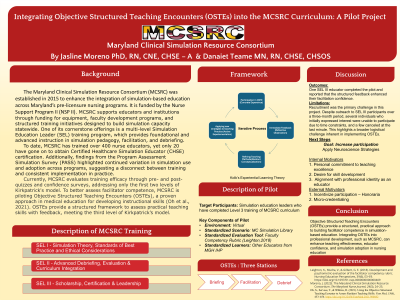Education
(46) Integrating OSTEs into the MCSRC Curriculum: A Pilot Project
Thursday, June 19, 2025
5:00 PM - 6:30 PM MST
Location: Exhibit Hall


Jasline Moreno, PhD,RN,CHSE-A,CNE
Faculty Lead
Maryland Clinical Simulation Resource Consortium
Beltsville, Maryland, United States
Lead Author(s)
Abstract: Background
The Maryland Clinical Simulation Resource Consortium (MCSRC), funded by the NSP II and established in 2015, supports simulation-based learning across Maryland. While MCSRC has trained over 350 educators in simulation, only 18 have obtained Certified Healthcare Simulation Educator (CHSE) certification. The 2017 Program Assessment Simulation Survey (PASS) highlighted a gap in simulation adoption within nursing programs (Beroz, 2017), suggesting a disconnect between training and practice.
Guiding Conceptual or Theoretical Framework
Currently, MCSRC evaluates training efficacy through pre- and post-quizzes and confidence surveys, addressing only the first two levels of Kirkpatrick's model. To better assess facilitator competence, MCSRC is piloting Objective Structured Teaching Encounters (OSTEs), a proven approach in medical education for developing instructional skills (Cerrone et al., 2017; Trowbridge, 2011; Oh et al., 2021). OSTEs provide a structured framework to assess practical teaching skills with feedback, meeting the third level of Kirkpatrick’s model.
Project Description
The pilot OSTE uses standardized scenarios from Montgomery College’s simulation library, with project developers as standardized participants (SPs). Three stations—briefing, facilitation, and debriefing—were evaluated using Leighton’s (2018) Facilitator Competency Rubric (FCR) to enhance facilitator competence assessment.
Target Population & Setting
The target population was simulation education leaders who had completed Level 3 MCSRC training, and the pilot sessions were conducted via Zoom.
Outcomes
Pilot outcomes showed OSTEs effectively support facilitator competence but highlighted challenges in recruitment, logistics, and resource needs.
Discussion
Integrating OSTEs into the MCSRC curriculum promises multifaceted benefits for educators, nursing students, and the quality of patient care.
Please include a short summary of your presentation that highlights why an attendee would want to view your poster.: This poster highlights a novel approach to evaluating facilitator competence through Objective Structured Teaching Evaluations (OSTEs), which are especially relevant as nursing education explores competency-based models. Attendees will discover practical applications of OSTEs in simulation education, learn how to enhance teaching effectiveness, and explore ways to integrate these methods into their programs.
The Maryland Clinical Simulation Resource Consortium (MCSRC), funded by the NSP II and established in 2015, supports simulation-based learning across Maryland. While MCSRC has trained over 350 educators in simulation, only 18 have obtained Certified Healthcare Simulation Educator (CHSE) certification. The 2017 Program Assessment Simulation Survey (PASS) highlighted a gap in simulation adoption within nursing programs (Beroz, 2017), suggesting a disconnect between training and practice.
Guiding Conceptual or Theoretical Framework
Currently, MCSRC evaluates training efficacy through pre- and post-quizzes and confidence surveys, addressing only the first two levels of Kirkpatrick's model. To better assess facilitator competence, MCSRC is piloting Objective Structured Teaching Encounters (OSTEs), a proven approach in medical education for developing instructional skills (Cerrone et al., 2017; Trowbridge, 2011; Oh et al., 2021). OSTEs provide a structured framework to assess practical teaching skills with feedback, meeting the third level of Kirkpatrick’s model.
Project Description
The pilot OSTE uses standardized scenarios from Montgomery College’s simulation library, with project developers as standardized participants (SPs). Three stations—briefing, facilitation, and debriefing—were evaluated using Leighton’s (2018) Facilitator Competency Rubric (FCR) to enhance facilitator competence assessment.
Target Population & Setting
The target population was simulation education leaders who had completed Level 3 MCSRC training, and the pilot sessions were conducted via Zoom.
Outcomes
Pilot outcomes showed OSTEs effectively support facilitator competence but highlighted challenges in recruitment, logistics, and resource needs.
Discussion
Integrating OSTEs into the MCSRC curriculum promises multifaceted benefits for educators, nursing students, and the quality of patient care.
Please include a short summary of your presentation that highlights why an attendee would want to view your poster.: This poster highlights a novel approach to evaluating facilitator competence through Objective Structured Teaching Evaluations (OSTEs), which are especially relevant as nursing education explores competency-based models. Attendees will discover practical applications of OSTEs in simulation education, learn how to enhance teaching effectiveness, and explore ways to integrate these methods into their programs.
Learning Objectives:
- Identify three key components of Objective Structured Teaching Encounters (OSTEs).
- Describe the strengths and challenges associated with integrating OSTEs into teaching practice.
- Develop a strategic plan for implementing OSTEs in educational settings.
